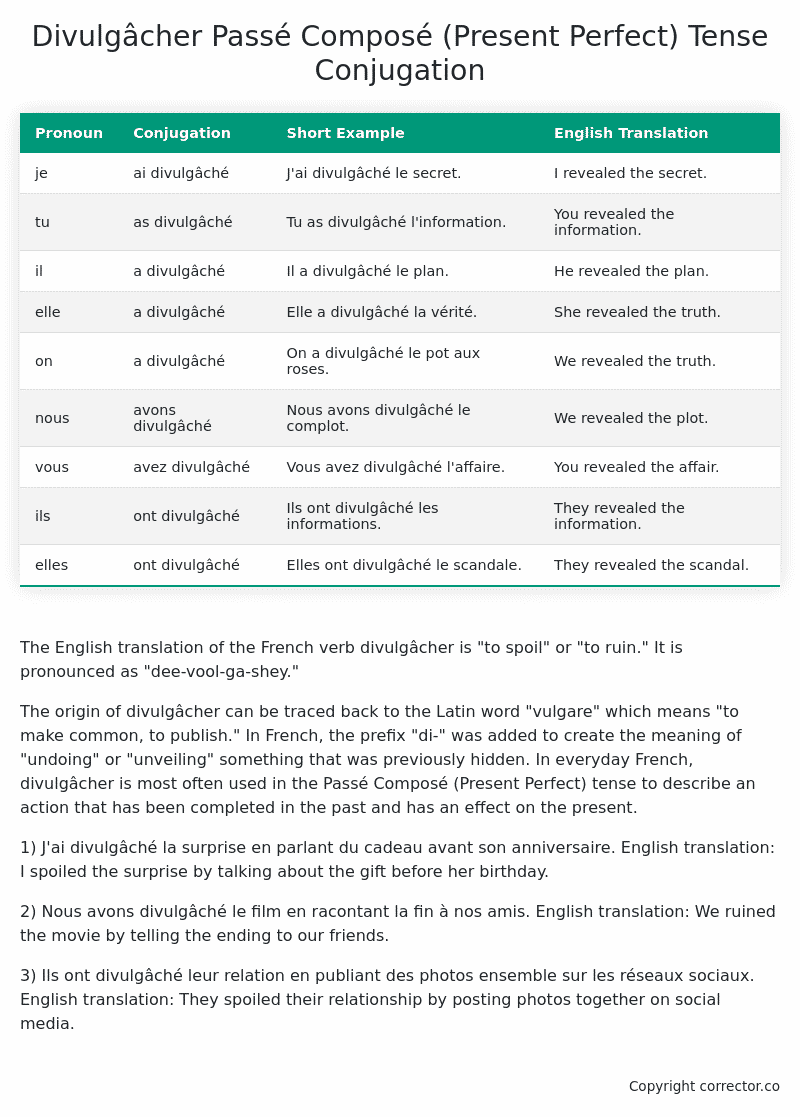Passé Composé (Present Perfect) Tense Conjugation of the French Verb divulgâcher
Introduction to the verb divulgâcher
The English translation of the French verb divulgâcher is “to spoil” or “to ruin.” It is pronounced as “dee-vool-ga-shey.”
The origin of divulgâcher can be traced back to the Latin word “vulgare” which means “to make common, to publish.” In French, the prefix “di-” was added to create the meaning of “undoing” or “unveiling” something that was previously hidden. In everyday French, divulgâcher is most often used in the Passé Composé (Present Perfect) tense to describe an action that has been completed in the past and has an effect on the present.
1) J’ai divulgâché la surprise en parlant du cadeau avant son anniversaire.
English translation: I spoiled the surprise by talking about the gift before her birthday.
2) Nous avons divulgâché le film en racontant la fin à nos amis.
English translation: We ruined the movie by telling the ending to our friends.
3) Ils ont divulgâché leur relation en publiant des photos ensemble sur les réseaux sociaux.
English translation: They spoiled their relationship by posting photos together on social media.
Table of the Passé Composé (Present Perfect) Tense Conjugation of divulgâcher
| Pronoun | Conjugation | Short Example | English Translation |
|---|---|---|---|
| je | ai divulgâché | J’ai divulgâché le secret. | I revealed the secret. |
| tu | as divulgâché | Tu as divulgâché l’information. | You revealed the information. |
| il | a divulgâché | Il a divulgâché le plan. | He revealed the plan. |
| elle | a divulgâché | Elle a divulgâché la vérité. | She revealed the truth. |
| on | a divulgâché | On a divulgâché le pot aux roses. | We revealed the truth. |
| nous | avons divulgâché | Nous avons divulgâché le complot. | We revealed the plot. |
| vous | avez divulgâché | Vous avez divulgâché l’affaire. | You revealed the affair. |
| ils | ont divulgâché | Ils ont divulgâché les informations. | They revealed the information. |
| elles | ont divulgâché | Elles ont divulgâché le scandale. | They revealed the scandal. |
Other Conjugations for Divulgâcher.
Le Present (Present Tense) Conjugation of the French Verb divulgâcher
Imparfait (Imperfect) Tense Conjugation of the French Verb divulgâcher
Passé Simple (Simple Past) Tense Conjugation of the French Verb divulgâcher
Passé Composé (Present Perfect) Tense Conjugation of the French Verb divulgâcher (this article)
Futur Simple (Simple Future) Tense Conjugation of the French Verb divulgâcher
Futur Proche (Near Future) Tense Conjugation of the French Verb divulgâcher
Plus-que-parfait (Pluperfect) Tense Conjugation of the French Verb divulgâcher
Passé Antérieur (Past Anterior) Tense Conjugation of the French Verb divulgâcher
Futur Antérieur (Future Anterior) Tense Conjugation of the French Verb divulgâcher
Subjonctif Présent (Subjunctive Present) Tense Conjugation of the French Verb divulgâcher
Subjonctif Passé (Subjunctive Past) Tense Conjugation of the French Verb divulgâcher
Subjonctif Imparfait (Subjunctive Imperfect) Tense Conjugation of the French Verb divulgâcher
Conditionnel Présent (Conditional Present) Tense Conjugation of the French Verb divulgâcher
Conditionnel Passé (Conditional Past) Tense Conjugation of the French Verb divulgâcher
L’impératif Présent (Imperative Present) Tense Conjugation of the French Verb divulgâcher
L’infinitif Présent (Infinitive Present) Tense Conjugation of the French Verb divulgâcher
Struggling with French verbs or the language in general? Why not use our free French Grammar Checker – no registration required!
Get a FREE Download Study Sheet of this Conjugation 🔥
Simply right click the image below, click “save image” and get your free reference for the divulgâcher present perfect tense conjugation!

Divulgâcher – About the French Passé Composé (Present Perfect) Tense
Formation of the Passé Composé
Set the auxiliary verb with either
Conjugate the auxiliary verb
Add the past participle
Common everyday usage patterns
Narrating Past Events
Sequential Actions
Describing Completed Actions
Interactions with other tenses
Imperfect Tense
Conditional and Future Tenses
Summary
I hope you enjoyed this article on the verb divulgâcher. Still in a learning mood? Check out another TOTALLY random French verb conjugation!


